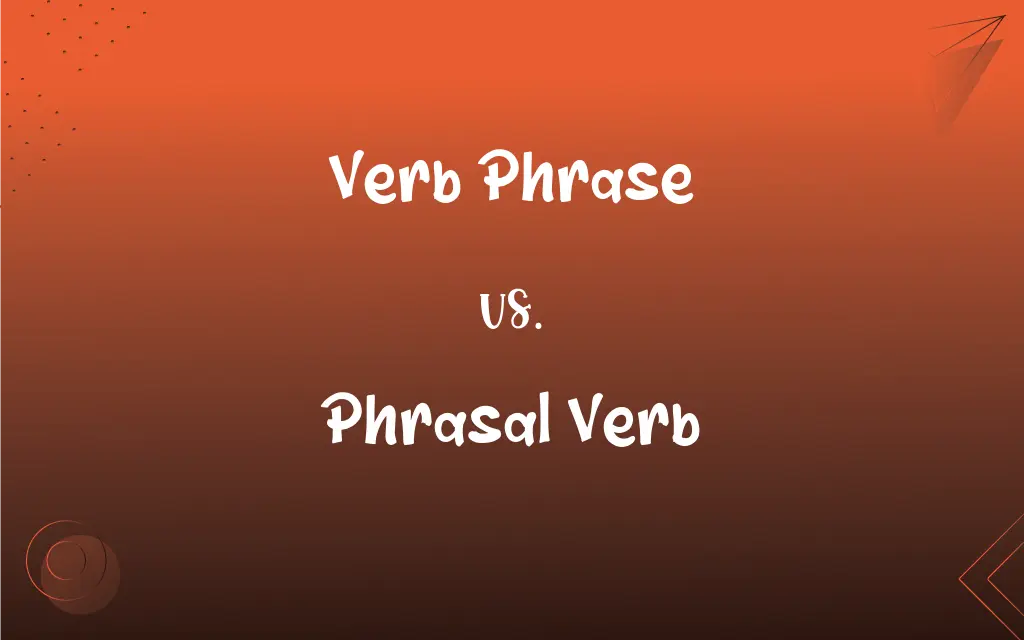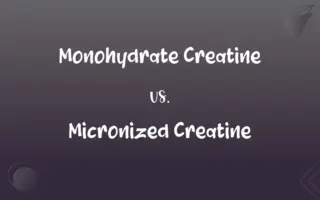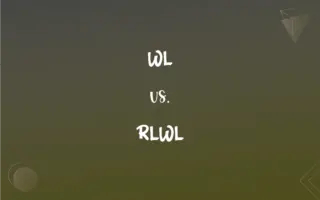Verb Phrase vs. Phrasal Verb: What's the Difference?
Edited by Aimie Carlson || By Harlon Moss || Published on February 24, 2024
A verb phrase is a combination of a main verb and its auxiliaries, while a phrasal verb is a verb combined with a preposition or adverb, changing its meaning.

Key Differences
A verb phrase consists of a main verb along with its helping (auxiliary) verbs, providing additional grammatical or semantic information. Phrasal verbs are unique combinations of verbs with prepositions or adverbs, resulting in new meanings often unrelated to the original verb.
Verb phrases are integral to conveying tense, aspect, mood, and voice in English sentences. Phrasal verbs, conversely, are idiomatic expressions where the combination of verb and particle (preposition or adverb) creates a meaning different from the individual words.
In verb phrases, the main verb is the core of meaning, supported by auxiliaries like "is," "have," or "will." Phrasal verbs, such as "give up" or "look after," form a single semantic unit where the preposition or adverb significantly alters the verb's meaning.
Verb phrases can be modified by adverbs, but the basic structure remains verb + auxiliaries. Phrasal verbs are less flexible in structure; the verb and its particle are fixed in order to maintain the idiomatic meaning.
Comparison Chart
Definition
Main verb + auxiliary verbs
Verb + preposition/adverb
ADVERTISEMENT
Role in Sentence
Conveys tense, aspect, mood, voice
Creates idiomatic, new meanings
Examples
"is running," "have seen"
"give up," "look after"
Flexibility
Can be modified by adverbs
Fixed combination for set meaning
Relationship of Components
Auxiliaries support main verb
Preposition/adverb alters meaning
Verb Phrase and Phrasal Verb Definitions
Verb Phrase
Integral to sentence structure.
He can play the guitar.
ADVERTISEMENT
Phrasal Verb
A verb combined with a preposition or adverb.
She turned off the light.
Verb Phrase
Main verb with one or more auxiliary verbs.
She has been sleeping for hours.
Phrasal Verb
Creates a meaning different from the original verb.
We ran into an old friend.
Verb Phrase
Conveys tense, aspect, and mood.
They will be arriving soon.
Phrasal Verb
Fixed combination of verb and particle.
She looks after her younger siblings.
Verb Phrase
Expresses action, state, or relation.
The sun is shining brightly.
Phrasal Verb
Often idiomatic in nature.
He finally gave in to the demands.
Verb Phrase
A grammatical unit in a sentence.
I am writing a letter.
Phrasal Verb
Can be separable or inseparable.
They called off the meeting.
FAQs
What's an example of a verb phrase?
"Has been running" is a verb phrase.
Can a verb phrase stand alone?
Yes, it can be the main part of a sentence.
Are phrasal verbs always idiomatic?
Often, but not always; their meanings can sometimes be guessed from the words.
Give an example of a phrasal verb.
"Give up" is a phrasal verb.
What is a verb phrase?
A combination of a main verb and its auxiliary verbs.
Do verb phrases change the tense of a sentence?
Yes, they are key to indicating tense.
Can a phrasal verb be literal?
Rarely, as they usually have idiomatic meanings.
Can phrasal verbs change in form?
They remain fixed to retain their idiomatic meaning.
What is a phrasal verb?
A verb combined with a preposition or adverb that changes its meaning.
Can verb phrases be complex?
Yes, they can include multiple auxiliaries and modifiers.
Do verb phrases express action?
Yes, they express action, state, or relation.
Are all phrasal verbs separable?
No, some are inseparable, like "run into."
Is "break down" always a phrasal verb?
Yes, as it combines 'break' with 'down' to create a new meaning.
Are verb phrases important for English grammar?
Absolutely, they are essential for constructing sentences.
Can phrasal verbs be informal?
Yes, they are often used in informal speech.
Do phrasal verbs have different meanings?
Yes, often unrelated to the original meanings of the words.
Is "is eating" a verb phrase?
Yes, it combines the auxiliary 'is' with the main verb 'eating.'
Is "will be going" a verb phrase?
Yes, it combines the main verb with auxiliaries.
Can a verb phrase include modal verbs?
Yes, like "can go" or "should be."
Are phrasal verbs used in formal writing?
They can be, but some prefer more formal synonyms in formal writing.
About Author
Written by
Harlon MossHarlon is a seasoned quality moderator and accomplished content writer for Difference Wiki. An alumnus of the prestigious University of California, he earned his degree in Computer Science. Leveraging his academic background, Harlon brings a meticulous and informed perspective to his work, ensuring content accuracy and excellence.
Edited by
Aimie CarlsonAimie Carlson, holding a master's degree in English literature, is a fervent English language enthusiast. She lends her writing talents to Difference Wiki, a prominent website that specializes in comparisons, offering readers insightful analyses that both captivate and inform.







































































